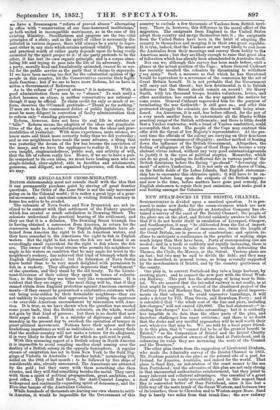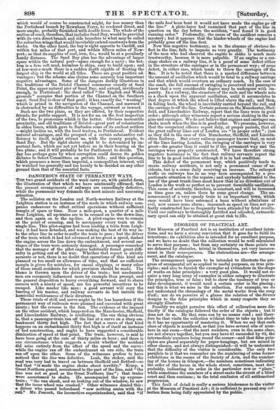NEW STEAM-DOCKS IN THE BRISTOL CHANNEL. SOMERSETSHIRE is divided upon
a nautical question. It is pro- posed to make new docks for the ocean-steamers which are now multiplying so rapidly. Already an Australian Company has ob- tained a survey of the coast of the Bristol Channel; the people of the place are on the alert, and Bristol suddenly awakes to the fact that if it do not bestir itself in emulation of Liverpool, Glasgow, and Southampton, it may "be obliterated from the list of import- ant seaports." Steam-ships of immense size, twice the length of the Great Britain, are in process of construction ; and opinion in- clines to anticipate a continuance in the practice of making ships much larger than they have been. Ports of corresponding size are needed ; and in a trade so suddenly and rapidly increasing, there is room for the Severn to take its share, without defrauding the Thames, the Clyde, the Mersey, or the Solent. Various plans are on foot ; but two may be said "to divide the field ; and they may also be described, in general terms, as being severally supported by the merchantmen of Bristol, and by the country gentlemen of the county. One plan is, to convert Portishead Bay into a large harbour, by erecting piers; and to connect the new port with the Great West- ern Railway. This port has the advantage of being near to Bris- tol. We are assured that the intended railway is not really, as at first might be supposed, a revival of the abandoned project of the Portbury Pier and Harbour line, but that it offers great improve- ments on that scheme. To avoid expensive tannelings, it will make a detour by Pill, Ham Green, and Rownham Ferry ; and it is calculated that "the whole cost of the line and piers, including law-charges," will not exceed 120,0001. The last statement—" in- cluding law-charges" too !—looks astounding; but it is evidently less tangible in its data than the other ;parts of the plan, and therefore challenges less exact criticism ; and there is no doubt that the docks and any needful approaches will be well worth their cost, whatever that may be. We are told by a local paper friend- ly to this plan, that it "cannot fail to be of the greatest benefit to Bristol," "as the Corporation of Bristol and the Bristol Charity Trustees are the greatest owners of the land at Portishead, and in enhancing its value they are increasing the rents of the Council and the Trustees."
The other plan starts from the suggestion of Lieutenant Denham, who made the Admiralty survey of the Bristol Channel in 1835. Mr. Denham4, inted to one place as the natural site of a port for Ireland, forerica, Australia and indeed for the world. That place is Sand Bay, an indentation of the coast nearer to the sea than Portishead ; and the advocates of this plan are not only strong in that nnconcerted authoritative reinforcement, but they point to many inherent and collateral advantages. One essential of a great dock should be its ready accessibility; and in this respect Sand Bay is somewhat better off than Portishead, since it hes but a little way off the main trunk of the Great Western, and between two of its branches, those to Clevedon and to Weston-super-Mare. Sand Bay is barely two miles from that trunk-line ; the new railway
which would of course be constructed might, for less money than the Portishead branch by Rownham Ferry, be rendered direct, and more ample; probably furnished with double lines. The whole of the section of ooast, therefore, that includes Sand Bay, would be provided with its own direct branch and side branches to what may be called the suburban wings that would inevitably extend coastways from the docks. On the other hand, the bay is right opposite to Cardiff, and within ten miles of that port, and within fifteen miles of New- .rt ; so that its supplies of coal, iron, &c. would be at a peculiarly
dy distance. The Sand Bay plan has the advantage of larger space within the natural port—space enough for a navy; the bot- tom is a firm soft mud, harmless to ships, easy to built upon; and at low-water-mark there is a sudden depth capable of floating the largest ship in the world at all tides. These are great positive ad- vantages ; but the scheme also claims some scarcely less important negative advantages. Some of the dangers darkly illustrious in the traditions of the Bristol Channel commence exactly at Sand Point, the upper natural pier of Sand Bay, and extend, invidiously enough, to Portishead : the shoal called "the English and Welsh grounds" occupies that portion of the Channel on the Southern coast. Sand Bay is clear of that peril; it has exactly the " westing " which is prized in the navigation of the Channel and seaward it is obstructed by no difficulties to the voyage, out-Ward or inward.
Such are the two plane, as they are offered, by their respective friends, for public: support. It is not for us, on the first inspection of the two, to pronounce which is the better. Obvious mercantile proximity, and old traditions of Bristol—great port of colonization in olden times which gave to Barbados some of its earliest settlers —might incline us, with the local traders, to Portishead. Evident natural advantages, and the prospect of a certain substantive suf- ficiency to itself, might attract us, with the county people, to Sand Bay. But the right choice ought to be determined by im- portant facts, which are not yet before us in their bearing on the two plans ; and it will probably be for Parliament to decide. The • day has perhaps gone by when corruption could decree its golden dictates to Select Committees on private bills; and this question which possesses a more than imperial, a cosmopolitan interest, will ' be watched too generally and too keenly to be decided on any other ground than that of the essential facts.
1.1



























 Previous page
Previous page